Alexander Kristoff finishes the season as the most efficient rider in the peloton, winning close to one in every four races he started: 20 wins for 82 race days. It’s an incredible rate when you consider he’s had a few training races and some mountain stages along the way too. Here’s a look at the win rates of the top riders, why it pays to be a sprinter and a look at those who slid down the rankings this year too.
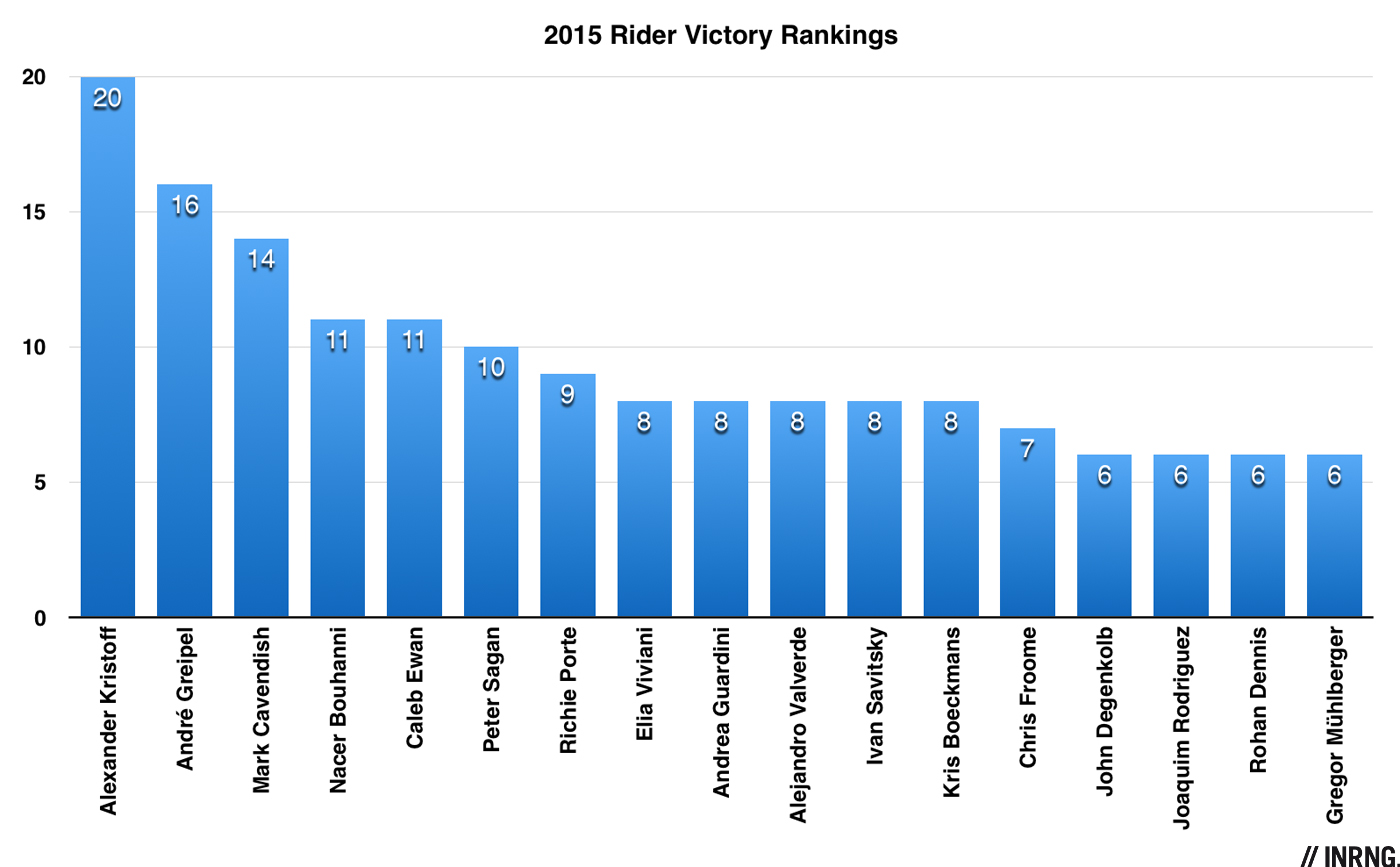
First is the rider victory rankings for 2015 with Kristoff topping the table, chances are you’ve seen this already. But what about efficiency, the rate at which a rider wins? Let’s look at the win rates of various riders.
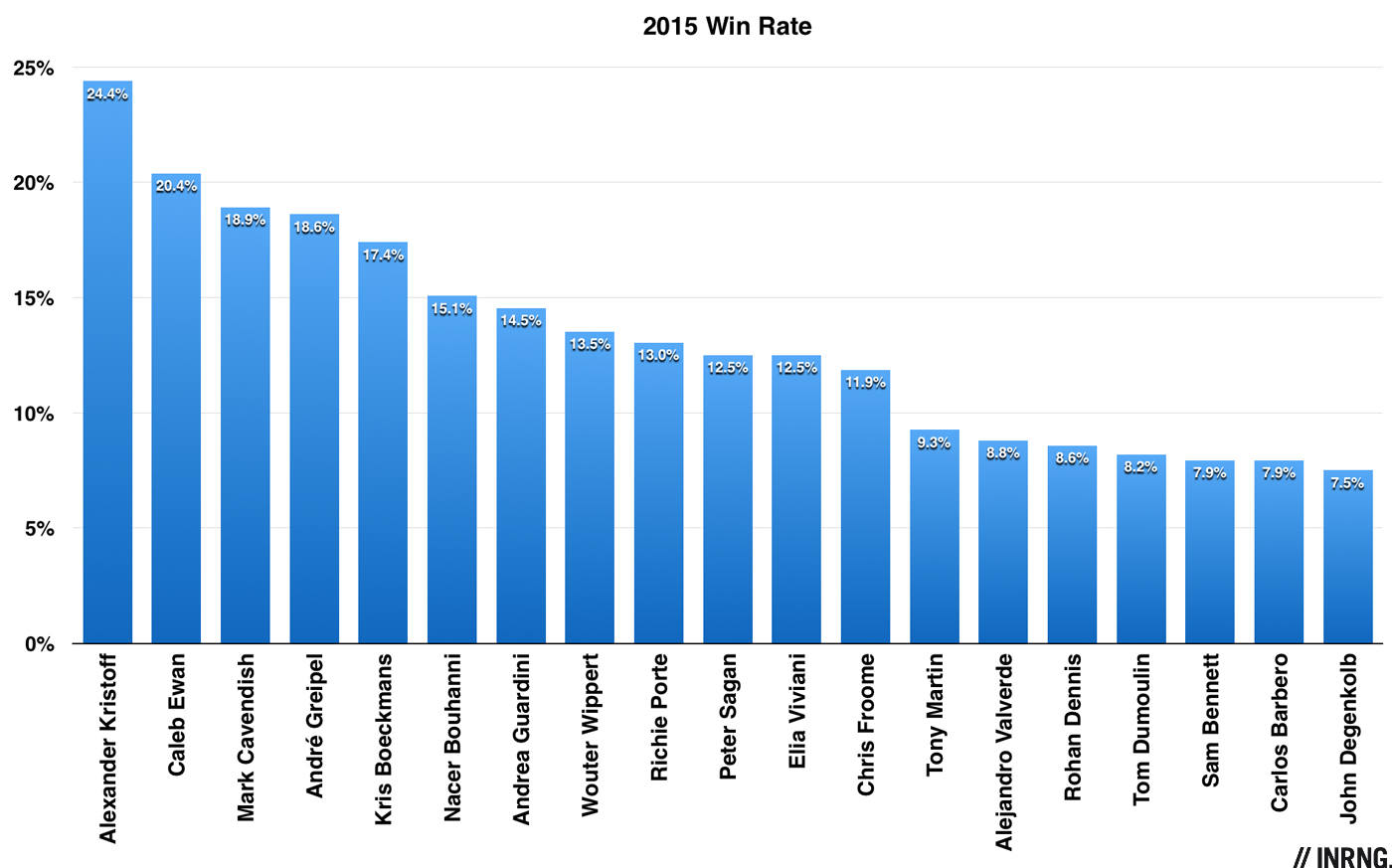
As the chart of the top-20 most efficient riders in the World Tour and Pro Conti ranks shows there’s no photo finish needed for Kristoff. His successes have been regular with only the Tour de France as a blank spot this year. It’s good for him but also his team who will back him time and again and the members of his sprint train will be collecting tidy bonuses this year.
Caleb Ewan is the surprise second placed finisher, 11 wins in 54 days and if some of these came in smaller races he’s a first year pro and took a stage of the Vuelta. There’s talk of Orica-Greenedge becoming a GC team but how they manage Ewan, Matthews and other sprinters alongside the Yates brothers and Estaban Chaves will be interesting to watch.
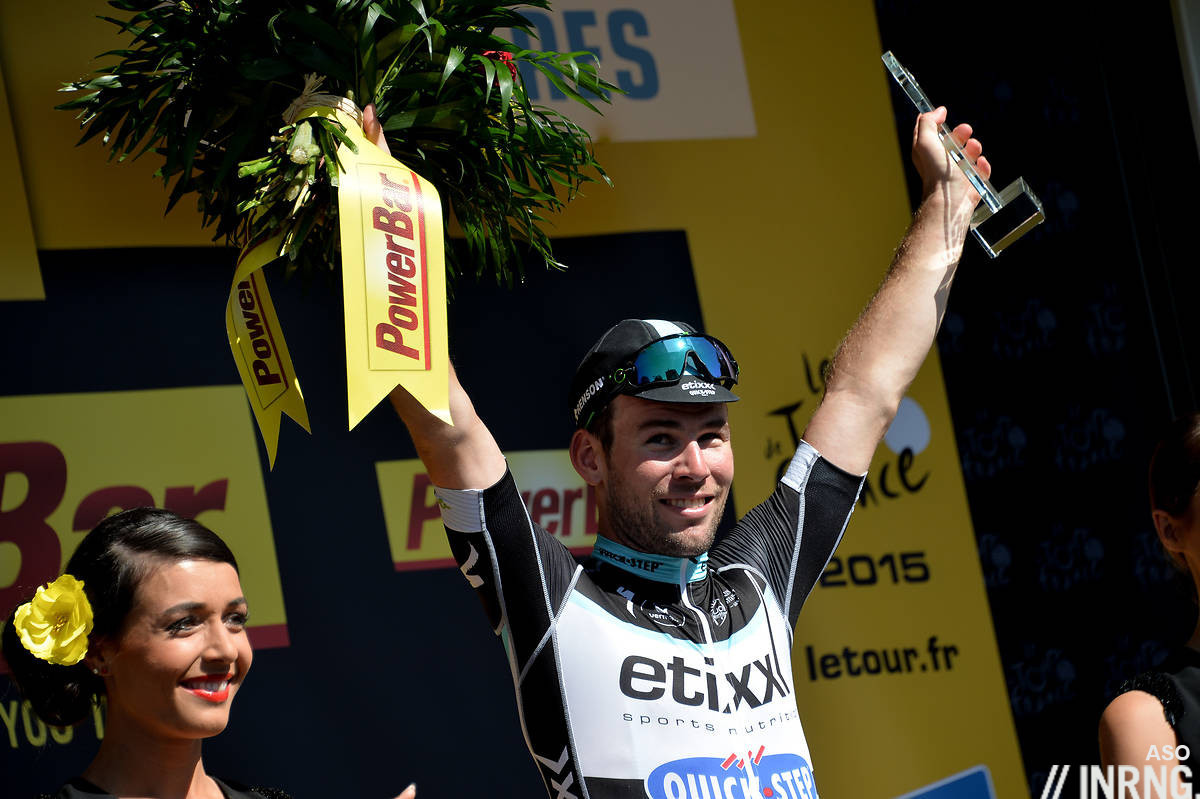
Mark Cavendish turned thirty this year and it’s been a mixed season interrupted by injuries, 14 wins from 74 race days is still very good so if he stays healthy and lucky in 2016 then MTN-Qhubeka will be racking up the wins. Next come Lotto-Soudal pairing André Greipel and Kris Boeckmans, team mates and both regular winners with Boeckmans winning sprints in Northern France, Belgium and the Netherlands and if Greipel has had a great season, he’s been more efficient in years past, a subject we’ll get to in a minute. Nacer Bouhanni had 11 from 73, proof he’s capable of striking regularly as long as he can stay upright in a season that’s perhaps been more famous for crashing than winning, especially his Tour de France exit.
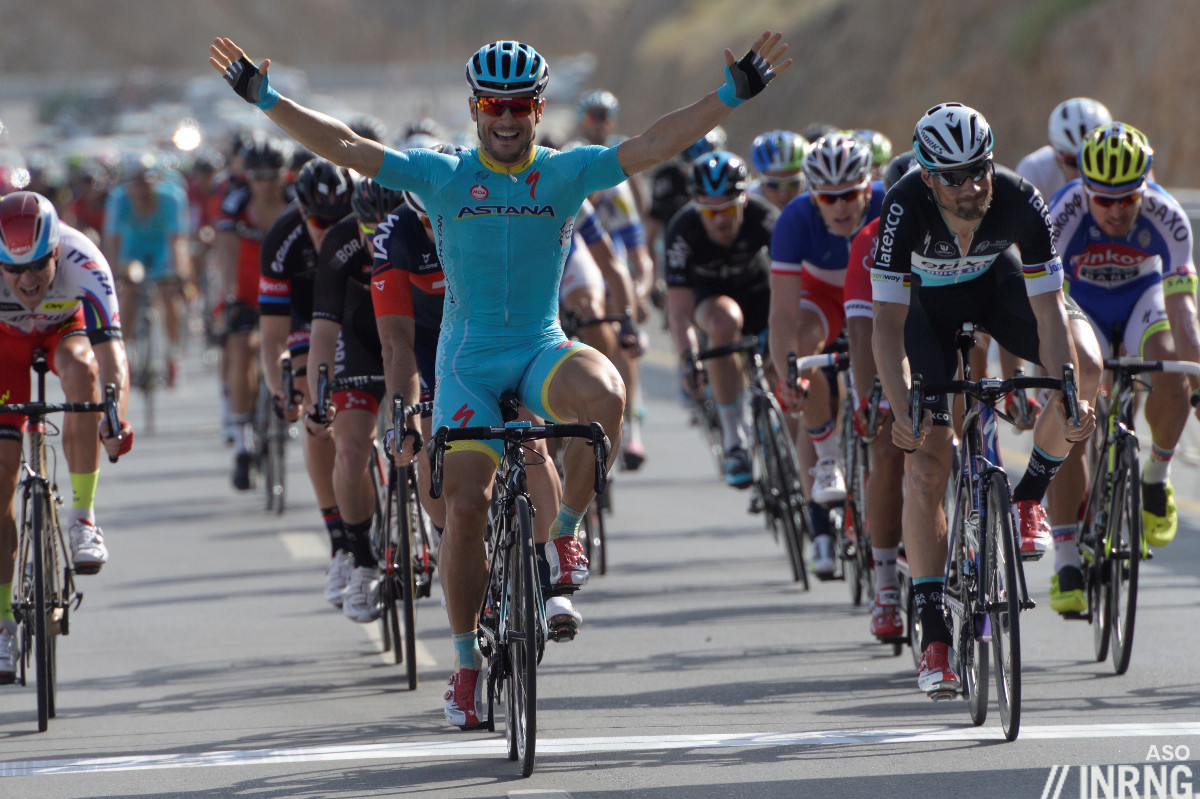
Who is Astana’s most prolific winner? You’d probably think Fabio Aru or Vincenzo Nibali given the Kazakh team is built for stage racing but it’s Andrea Guardini with eight sprint successes. If you associate Astana with stage racing it’s normal and Guardini can’t even get a ride in the Giro, his home tour, such was the team’s focus on backing Fabio Aru. Instead he picks up wins around the world from Malaysia to Dubai. Another globetrotter is Wouter Wippert, the Dutchman has been riding for Drapac and taken five wins from 37 days, a percentage rate from a reduced calendar but although he did win in the World Tour with the closing criterium stage of the Tour Down Under. He’s joining Cannondale-Garmin and if he can progress should get them a few wins in 2016.
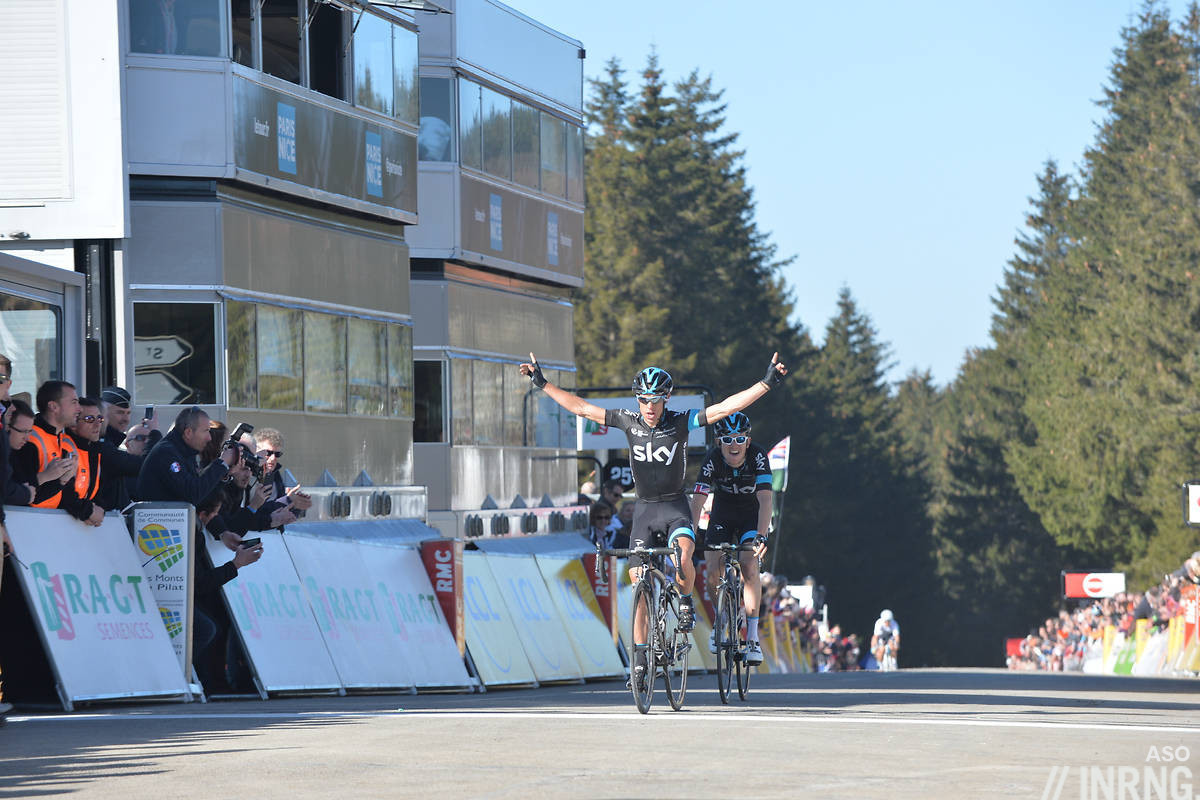
Richie Porte is the first non-sprinter on the list, with 9 wins from 69 race days, impressive given almost a third of this, the Tour de France, was spent in service of Chris Froome. Obviously a stage racer would like to win as much as possible but in reality the aim of the game is energy preservation and only striking out when it counts so wins don’t come as often for this kind of rider. Froome is near on a similar count. Valverde has had a great year and finished atop the rankings but “only” had eight wins to show from 91 days of racing so while he’s probably had his best ever season he’s still far from his days as El Imbatible, “The Invincible”.
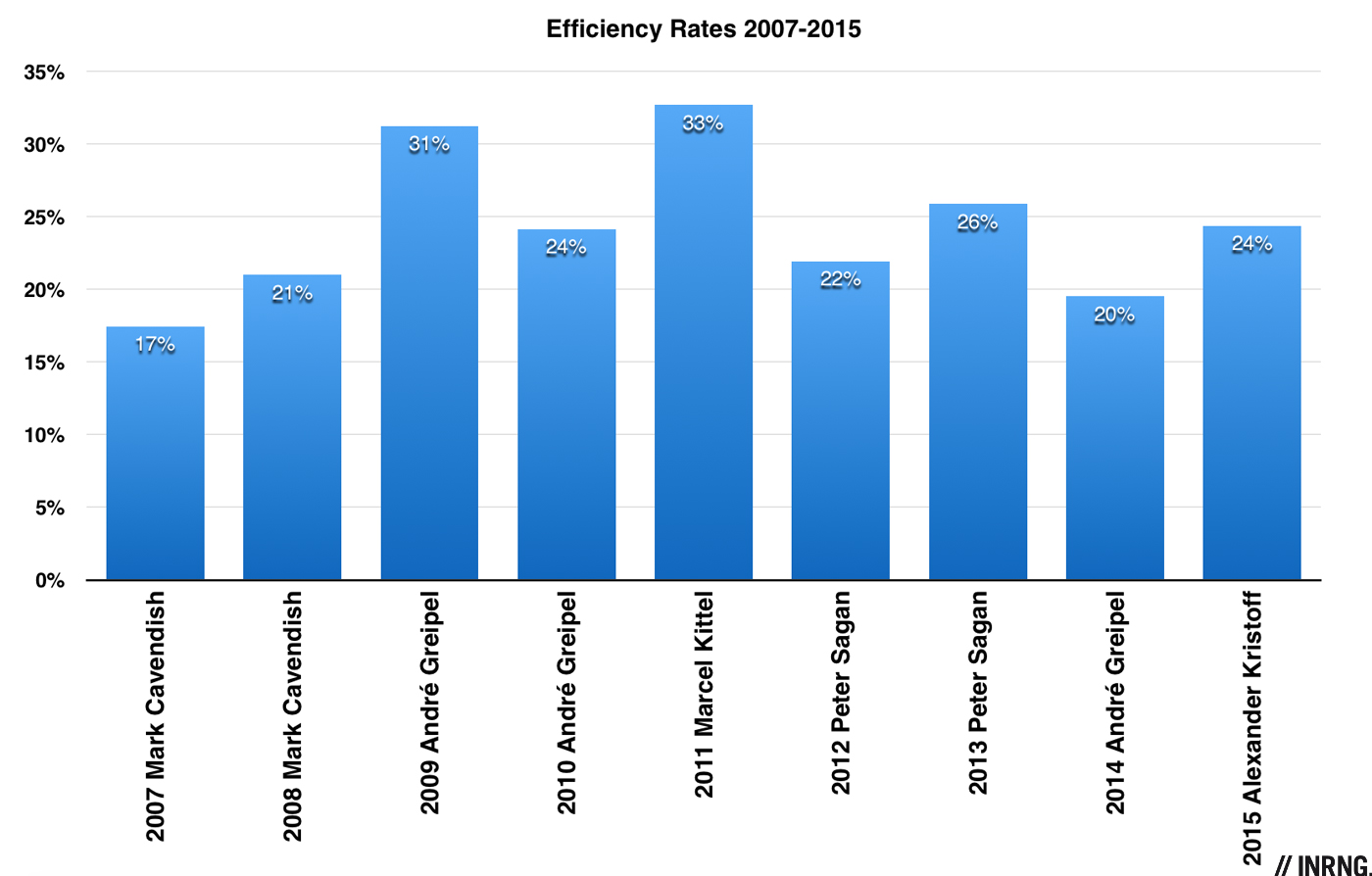 If you think Kristoff is good the chart above is a comparison between the most efficient riders in recent years with Marcel Kittel in 2011 taking 17 wins from 52 days in his first year as a pro. Some of the results came from smaller races like the Tour of Langkawi and the Jayco Herald Sun Tour but he was also winning stages in the Tour of Poland and the Vuelta too.
If you think Kristoff is good the chart above is a comparison between the most efficient riders in recent years with Marcel Kittel in 2011 taking 17 wins from 52 days in his first year as a pro. Some of the results came from smaller races like the Tour of Langkawi and the Jayco Herald Sun Tour but he was also winning stages in the Tour of Poland and the Vuelta too.
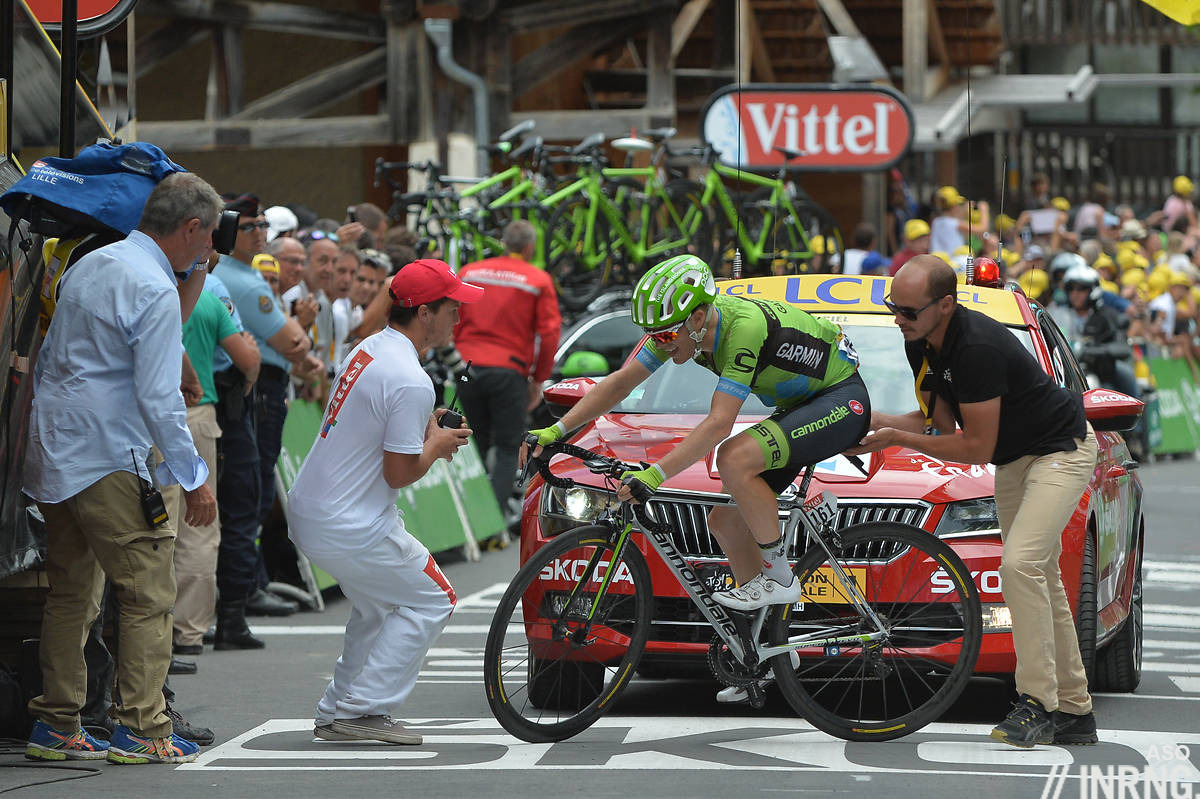
Last and least?
If we’ve looked at some of the most successful riders of 2015 who were the flops? Dividing the number of race days by wins would mean Martijn Keizer, 99 race days and no wins tops the table but riding more days than anyone else means Keizer deserves a prize or at least a bonus from his team plus he managed three podium places, a tale of solidity. Similarly there were many tales of disappointment in this cruel sport for example Tom Boonen and Fabian Cancellara have had bad seasons but it’s not like they’ve wasted it. The same for Simon Gerrans who popped more collarbones this year than champagne corks. Even without crashing Sep Vanmarcke was very unlucky in the spring classics with several punctures at the wrong time, it’d be hard to label him as a flop because he was trying so hard. Marcel Kittel didn’t race much but was forever playing catch-up after a mystery virus. Carlos Betancur seems more like the architect of his downfall but since no pro chooses to be overweight perhaps we should be careful with the jibes too? Still he did infuriate his team by proving impossible to reach during the year and at one point reports said he was due to fly to France to resume racing and get his work visa and the team sent someone to the airport to collect him but he didn’t show up and never told anyone he hadn’t boarded the flight.
Still in a bid to quantify a few fallers here’s a hand-picked selection of those who have descended the Cycling Quotient rankings:
- FDJ’s Arnaud Démare was close to topping the efficiency rankings a few years ago and admits he’s bombed this year (11th > 116th)
- Jean-Christophe Péraud falls from 16th to 239th place and you might think this is back to a more normal place after his stunning 2014 Tour de France but he’s never been so low since turning pro
- Sky’s Ben Swift isn’t winning so much for the team these days (50th > 153rd)
- Lotto-Jumbo signed Tom Van Asbroeck from Topsport hoping he’d continue the sprint success but it hasn’t worked out yet (29th > 171st); a lesson for Trek Factory Racing who’ve signed Edward Theuns
- Carlos Betancur slipped from 67th to 453rd after infuriating Ag2r La Mondiale management
- Less of a fall down the rankings but Lotto-Jumbo’s Wilco Kelderman has yet to break through from hope to big win (41st > 68th)
- Cannondal-Garmin’s Andrew Talansky never got the results he wanted, chasing his form of 2014 (88th > 197th) and is a reminder of how close success and failure can be as he was second in the Tour de France stage to Pra Loup
- Gianni Meersman took just three wins in 2015, a low score for the versatile finisher, (42nd > 249th)
- Lotto-Soudal’s Jelle Vanendert had the greatest slide down the rankings of anyone in the top-1000, going from 87th to 620th
- We hoped for a fresh start for Matt Goss has been invisible this year but this holds true last year too (802nd > 1871th). He’s joining British pro conti hopefuls One Pro Cycling in 2016 and even if he doesn’t turn things around his name might just be enough to secure them invitations from curious race organisers


Interesting, thank you.
Theuns not quite in the same boat as van Asbroeck, though. Lotto also has Greipel, Boeckmans, Debusschere for sprints, Trek has… Nizzolo?
That’s the other Lotto, as in Lotto-Soudal. Lotto-Jumbo have Moreno Hofland, another rider who has been misfiring but he has been injured this year too.
Any news on UCI setting a cap on number of seemingly identical world tour team names? Preferably set to one?
Ones Lotto and the other is LottoNL, how is that confusing? :p
Flicked through Cavendish’s results for this season the other day, 1 world tour win this year, same last year. Would also be interested to know how efficient each rider is per euro earned.
Unless they got him for a steal (which I doubt), for me the Dimension Data project is taking a huge risk betting the house on Cavendish. Let’s see if it pays off…….
The ‘risk’ is weighed in terms of publicity and not in wins, though. Win or loss, Cav is box office for the media and his impact on the Dimension Data brand will be far more predictable than his win tally in 2016.
True, however, they’ve signed him for 3 seasons.
Still a superstar regardless, that status won’t disappear even if he stops winning the biggest races. He’s a character and a very smart man when it comes to the media. Plus his experience and ethos is perfect to help guide up some youngsters and give the team some structure on the road.
Equally there’s still no pressure to get UCI Points to keep your WT place, so there’s actually very little gamble in any riderin terms of results. Currently teams really can pick and chose based on pleasing sponsors who don’t always want X wins in Y race.
I would suggest he is pretty poor at the media game, they show up because he has been a prolific winner of Tour stages. Contrast his palmares vs media success with a guy like Jens Voigt.
Winning Milan – San Remo is great for folk like you and me but in the markets that really count for Cavendish (UK and USA) it is all about the Tour and perhaps the Tour of California to a degree. As was pointed out above his immediate results aren’t going to effect exposure much but in the long run winning, stages at the Tour of Turkey isn’t going to cut it.
I am quite open to being wrong about Cavendish and the Dimension Data project, but I’ve said before it isn’t just about putting Renshaw in front of him and Eisel’s arm around him. HTC not only had Greipel (and others) at other races but he also had the like of a subservient T Martin, TJVG and other stellar TT engines controlling the peloton from 20-30k to go.
Interesting. As you point out, sprinter heavy, of course. Pleasantly surprised to see Cavendish up there in third – clearly the standard of the race wins is a separate issue but it just shows that even in a mixed year he’s still one of the most consistent winners. How he gets on next year is going to be a fascinating sub-plot for the season I think.
And, i’m not saying anything that lots of others have said, but I think Caleb Ewan is a future star!
Probably. Gaviria will give him a good run for his money though.
About Betancur I really think is awkward he’s been saying the new team is more professional than Agr2 when it is true that 80% of his interview he doesn’t like to be professional or capable of making some sacrifices or be austere in due of better career . That interview about to enjoy life and Colombia and when comes on Europe to stage “bikini’s mission” is really against him.
it’s a big shame because he seems more gifted than others Colombians, but much less focused.
It would be interesting to see individual starts against team wins…we all know that quite often a good finish is preceded by a lot of hard work from the domestiques, and a good leadout train. The sprinters get the glory, but are there stand-out team players who never see the podium?
Plenty but it’s hard to list, for example Kristoff has Marco Haller and Jacopo Guarnieri as his two lead out guys, Cavendish has Renshaw and so on but there are many more elements to make things work, determining a direct contribution vs general help is hard. Many of these names are less famous but usually earn a very good living because the teams/sprinters know exactly who is who.
I believe I have read and/or heard about some attempts at ranking domestiques. Something along the lines of being awarded points for being on the team that delivered the winner. Over a season, this would accumulate to “domestique of the year” or something to that effect. Can’t find it now, though, so I guess it didn’t universally catch on…
A good way i’ve heard is ranking TV time. I remember reading once that during a Tour de France the most viewable rider on TV was George Hincapie, and not superstar Armstrong, just because Big George was always pounding away on the front of the group.
But you’ve got guys who make up the sprint trains but also in those teams you’ve got riders whose job goes from KM 0 and finishes at KM 100 because they are selecting the break and keeping it in check. Always always overlooked.
Team managers and riders usually know exactly who these people are, word filters back from the bunch about the riders who can pull for 50km on the front, line out the peloton and make other people’s legs hurt a lot, even if they vanish by the time the TV coverage starts.
A wins vs starts list is pretty much always going to be biased in favor of the velocisti and let’s not forget there are WINS and there are wins. When it’s a value-of-win situation I think most would rate a monument victory as enough to make an entire season while a long list of minor wins is just that.
What is the thinking on Cavendish’ chances with his new squad, one that would seem to have a whole lot of strong locomotives in the train devoted solely to him? Is he no longer fast enough to win, even with the strongest sprint train in the race?
If I recall, Cavendish won his TdF stage in 2015 after ignoring his lead out and he was plenty quick enough that day when he waited and waited and got his timing right for once. It seemed to me the early season shocks meted out by Gaviria at the Tour de San Luis affected Cavendish quite significantly as following that experience he tended feel the need to go early for a lot of the time in his sprints afterwards until his TdF win. I think, if he stays healthy, his remaining Olympic track ambition may affect his 2016 road racing a fair bit.
Thinking of Marko Kump – former Tinkoff-Saxo rider with 18 wins for a Continental-level team this season, riding for Lampre next year – do riders with that kind of background tend to find success in bigger races when moving back up to a higher level?
It’s rare to go out of the top teams and then come back. Kump would have been very valuable if teams needed a rider with a lot of points to secure their position in the World Tour but this doesn’t apply at the moment given the 17 or maybe 18 teams in contention. Which means Kump’s been hired for what he can do rather than what he’s done, he’ll be a useful finisher but they’ve got a lot of others like this (eg Cimolai, Ulissi, Modolo) already.
I’ve read the interview with A.Demare in L’Équipe and it left me with the impression, that he by now lost the fun and trust/belief on the bike and questions everything and everyone. It seems he thought with N.Bouhanni gone, everything will automatically change for the better and was totally unprepared as it didn’t happen. Maybe he needs to focus more on himself, his own strengths and what he can do to be competitive? Because next year all will be so much harder for the sprinters: N.Bouhanni will hopefully stop crashing and the second year at Cofidis will certainly work better for him, A.Greipel will keep on going from strong to stronger, having unashamed much fun while doing so (and he will continue working hard for his team, when it is the others turn to shine), M.Kittel will hopefully come back stronger and more confident than ever, M.Cavendish has something to prove (like always), the Neo-pros will make their experiences (and hopefully have the time of their lives), plus all the other solid sprinters out there want to be in the mix, too. It will be a wild and crazy competitive year for the sprinters! And if A.Demare doesn’t get his confidence back, he will have a really tough time next year! I do hope, he can make good use of the off season and come back stronger again next year and fight it out with all the other sprinters.
Ever thought of looking more in depth to what’s happening with Goss? It seems like it was only a couple of years ago that Boonen was singing his praises as the next classics master.
I’m curious about this as well. As an Aussie i used to follow him quite closely and i really want to like the guy. I saw an interview or article recently and he was explaining why his season came unstuck (again). It was pretty weak to be honest. A crash here and there, nothing major from what i remember. Obviously cyclists have off years but this guy has had 3 or 4. The champions don’t dwell, they just pick themselves up and let their riding do the talking. And assuming they used a recent photo. He didn’t even look like a pro cyclist. I really hope he can find his mojo, stop dwelling and just get out and win.
http://cyclingtips.com.au/2015/10/where-it-went-wrong-for-matt-goss-the-last-two-years-havent-been-perfect/
Have been curious too and it seems a mix of different things, as the CT article looks at there’s been pressure on him as sprinter when he was more versatile (he won Sanremo by making the cut over the climbs) but also the comfort of a giant paypacket for two years, then weight gain and losing trust with management and more so it’s been hard to pinpoint one factor and even to weigh up the various factors. Still surprising that he didn’t pick-up again this year with MTN.
“I think we will get a lot of good races and I’m confident the races will be not too dissimilar to years in the past,” Matt ‘Five Bellies’ Goss told CyclingTips in a phone interview from MONACO.
That article talks about the WEIGHT of expectations and how things all got really TOP-HEAVY.
He’s just found some other mugs to fund his refuelling habits for another year.
Talansky’s problem appears to be that he is riding his bike sideways. You’d think that a world tour team would have noticed its rider’s incorrect riding style. Maybe they were scared of upsetting him?!
Sideways, whilst veering left into Simon Gerrans, then blaming Gerrans for the crash (2014 TDF).
Ash,
Please explain more of your thinking about Talannsky.
Ha, look at the photo above 😉
I’d have to quibble with ‘no pro chooses to be overweight’. For over 98% of people, if you consume more calories than you use, you put on weight. Unless Betancur is one of the tiny minority, it is his fault that he’s overweight. Same advice for him as for everyone else: eat less, exercise more.
Of course, ‘overweight’ is a relative term – and he is only overweight for a cyclist; not a normal human being. But that’s his profession of choice.
Of course, the reader is free to draw their own conclusions as to the rise and fall of riders’ fortunes: luck, lack of support from their team, injury, confidence,
For more general consistency, I wonder who has been on the podium most? Sagan had 32 according to PCS (although they make it 9 stage/one-day race wins).
Sprinter-friendly perspective.
All these criteria surely measure something, but having riders like Wippert (not to speak about almost unknown Savitsky or Barbero) among the best shows certain lack of weighting the success. A colleague of mine proposed that someone should think of a personal rating based on “whom have you beaten in a race”, like ATP in tennis or ELO in chess. It would be a very complicated formula, but there is a huge difference between wins of “sprint royal” on Champs Elysees and Vuelta last stage with virtually no sprinters left.
It would be very interesting to see a similar breakdown in WT-races only.